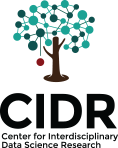Modeling environmental systems (70897)
Models are one of the main tools for system investigation in earth and environmental sciences. In this course, the students learn what a model is, steps in model development, types of models, calibration and validation methodologies, and sensitivity and uncertainty analyses. Additional topics include spatial models, data-driven models, and numerical models.
Program
Earth Sciences
Degree
Master
Instructors
Machine learning in earth and environmental sciences (70938)
This course describes the fundamentals underlying machine learning and presents common methods in the field. The students learn the theoretical aspects of these methods and apply them for problem-solving in earth and environmental sciences. A major part of the course is devoted to supervised learning and deep learning methods and includes hands-on tutoring.
Program
Earth Sciences
Degree
Master
Instructors
Quantitative Biological Research with Python – OPEN ONLINE (was 92847)
Quantitative Biological Research with Python is an online course for biology researchers (mostly graduate-level students) interested in conducting quantitative research and analyzing high-throughput data. It’s a very hands-on class with lots of exercises, elaborate code examples and recorded videos. The course teaches practical, high-level Python programming and quantitative skills for efficient biological research, as well…
Program
Structural & Molecular Biochemistry
Degree
Graduate Level
Instructors
- Michal Linial
- Nadav Brandes
Data Analysis for Neuroscience (76984)
The course will provide basic expertise in understanding the structure of data, time and frequency representations, filtering, parameter estimations and basics of statistical evaluation approaches.
Program
Brain Science: Computation & Information Proc.
Degree
Master's




